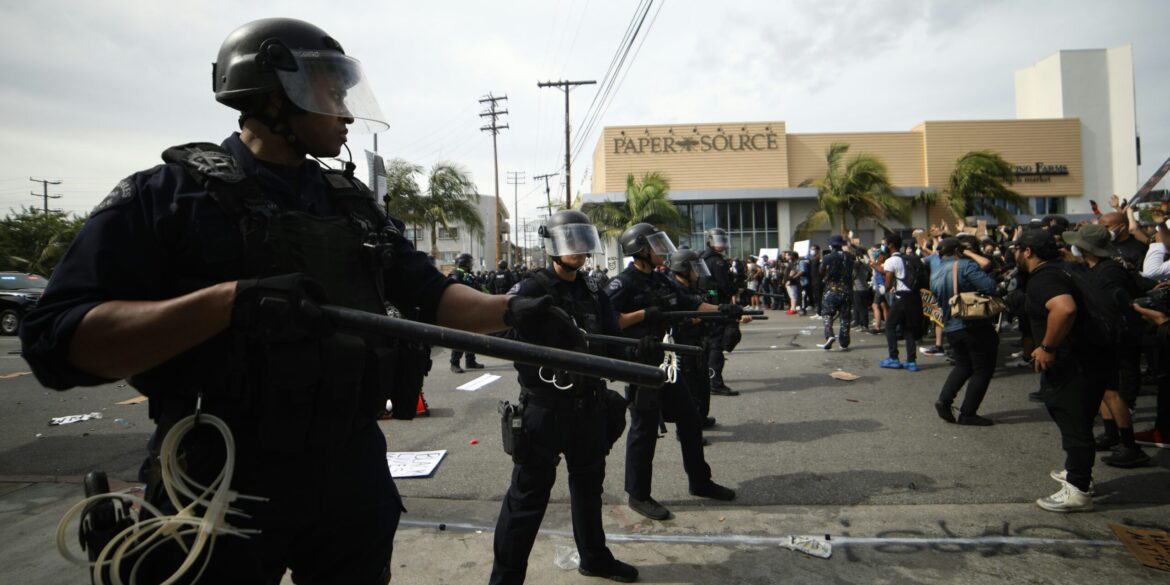On June 13, 2025, a troubling incident occurred in Los Angeles that has sparked widespread concern regarding the erosion of civil liberties and the increasing militarization of domestic law enforcement. U.S. Marines detained a civilian in what is believed to be the first instance of active-duty troops being deployed to detain a civilian under President Donald Trump’s orders. This unprecedented action raises significant questions about the use of military forces in civilian spaces and the implications it has for the rights of American citizens.
A First of Its Kind: Military Detains Civilian in Los Angeles
The incident in Los Angeles, which took place under the authority of President Trump’s executive order, marks a significant shift in how domestic law enforcement is carried out in the United States. Historically, the military has been prohibited from engaging in law enforcement duties under the Posse Comitatus Act of 1878, which was designed to prevent military intervention in domestic affairs. This law has been a cornerstone of the American democratic system, ensuring that civilian oversight of law enforcement remains intact.
However, the decision to deploy U.S. Marines in an urban environment to detain a civilian is seen as a direct challenge to this long-standing tradition. Critics argue that this action undermines the principle of civilian control over military forces and sets a dangerous precedent for future administrations. As the lines between military and law enforcement become increasingly blurred, there are growing concerns that this event could be the beginning of a broader trend that threatens the fundamental freedoms of American citizens.
The Implications for Civil Liberties
The militarization of domestic law enforcement has been a topic of debate in the U.S. for years, but recent developments like this one have taken the issue to new heights. Many civil rights advocates fear that the increasing use of the military in civilian areas could lead to an erosion of civil liberties. The presence of heavily armed military personnel in public spaces raises the potential for the abuse of power and the violation of constitutional rights, particularly the First and Fourth Amendments, which protect freedom of speech, assembly, and unreasonable searches and seizures.
One of the key concerns is the lack of accountability when military forces are used to police civilians. Unlike local police departments, the military operates under a different set of rules and does not adhere to the same transparency and oversight mechanisms. The involvement of military forces in law enforcement duties could potentially lead to a lack of proper checks and balances, further diminishing the rights of individuals and making it harder to challenge unlawful actions by authorities.
Moreover, the use of the military to detain civilians could be seen as a form of intimidation or coercion, especially in high-tension situations. The presence of soldiers, with their military training and equipment, can create an atmosphere of fear, making it difficult for civilians to assert their rights or question authority. In this context, it is crucial for both Congress and the judiciary to step in and assert their power to prevent the normalization of such practices, ensuring that military force is not used indiscriminately against American citizens.
The Role of Congress and the Judiciary
As concerns about the militarization of law enforcement grow, there is increasing pressure on Congress and the judicial system to intervene and protect civil liberties. Congress has the authority to enact laws that regulate the use of military forces in domestic spaces, ensuring that the military is not used to infringe upon the rights of American citizens. Furthermore, the judiciary has a critical role to play in reviewing cases where military involvement in law enforcement may violate constitutional rights, providing a necessary safeguard against overreach.
In response to this recent development, some lawmakers have called for hearings to investigate the use of the military in civilian law enforcement and to examine the legal and constitutional implications of such actions. It is essential that these branches of government act swiftly and decisively to prevent the normalization of military involvement in domestic policing, as this could have far-reaching consequences for the future of American democracy.
A Dangerous Precedent for Future Administrations
The actions taken under President Trump’s orders could set a precedent for future administrations, potentially opening the door for further military involvement in domestic affairs. While the deployment of troops for specific operations, such as counterterrorism efforts, has been justified in the past, the use of active-duty military personnel for routine law enforcement duties represents a significant departure from established norms.
The precedent set by this incident could encourage future presidents to bypass traditional law enforcement structures and rely on military forces to handle situations that are typically managed by civilian authorities. This could lead to a further erosion of trust in the police and other law enforcement agencies, as well as a greater reliance on military force to maintain order in domestic settings.
Protecting American Rights in an Era of Militarization
The growing trend of militarization in American society—seen in everything from the increasing use of military-style equipment by local police departments to the recent deployment of active-duty troops—has sparked a larger debate about the role of the military in civilian life. As the lines between military and law enforcement become more blurred, it is essential that Americans remain vigilant in defending their rights and ensuring that military force is not used as a tool of oppression.
Ultimately, the events in Los Angeles serve as a reminder of the importance of upholding the constitutional protections that form the foundation of American democracy. As the nation grapples with the implications of this incident, it is clear that the battle to preserve civil liberties and maintain the separation between military and law enforcement will be a crucial issue in the years to come. Congress, the judiciary, and the American people must stand united in their commitment to protecting the rights that define the nation.

